PLEASE NOTE:
While the following article relates to your Google search, the services and methods at Goodwin Hypnosis may differ from those mentioned below. Since 2007, we have helped thousands of clients to overcome emotional and behavioral challenges when all else had failed. According to many of them (and their referring healthcare providers), our methods are faster than talk therapy, easier than willpower, and safer than medication. If you’re ready to resolve your issues, skip the article and visit the rest of our website, where you can learn about our unique approach, watch client testimonial videos, and discover how working with us one-on-one could be the solution you’ve been searching for.
We can help you with a variety of issues relating to emotional trauma. While we don't diagnose disorders like PTSD, we have helped hundreds of clients to overcome a wide range of traumatic experiences and their negative effects with methods that are more efficient and comfortable than CBT or EMDR. If you would like to learn more about working with us one-on-one to clear your trauma, click here.
Introduction
In a world where connections can sometimes feel fleeting, the fear of abandonment looms large for many individuals, often manifesting as a profound anxiety that impacts relationships and self-worth. Abandonment phobia, or autophobia, is not merely a fear of being left alone; it intertwines with deeper emotional scars and past experiences, making it a complex struggle for those affected. Recognizing the signs and understanding the roots of this fear can pave the way for healing and recovery.
With compassionate strategies, such as therapy and hypnotherapy, individuals can embark on a transformative journey toward reclaiming their confidence and building healthier relationships. This exploration delves into the intricacies of abandonment phobia, offering insights and support for those seeking to navigate their emotional landscape and find peace within themselves.
Defining Abandonment Phobia: Understanding Autophobia
Abandonment phobia, also referred to as autophobia, denotes the intense anxiety of being abandoned or left alone. This apprehension can manifest in various ways, leading to anxiety and distress in relationships and social situations. For instance, individuals may cling to partners or friends, fearing that any sign of distance could lead to rejection.
It is essential to acknowledge that this phobia is not merely a dread of physical separation but includes psychological and mental components as well. Those suffering from separation anxiety may experience feelings of worthlessness, insecurity, and panic when faced with the possibility of being apart from loved ones. These feelings often stem from a lack of self-belief and self-esteem, which can be caused by negative experiences in childhood, criticism from authority figures, or unmet expectations in relationships.
Understanding this phobia is the first step toward managing its impact on one's life. Furthermore, addressing the root causes of these feelings through methods such as hypnosis can be an effective way to enhance self-confidence and self-worth, ultimately leading to a healthier relationship with oneself and others.
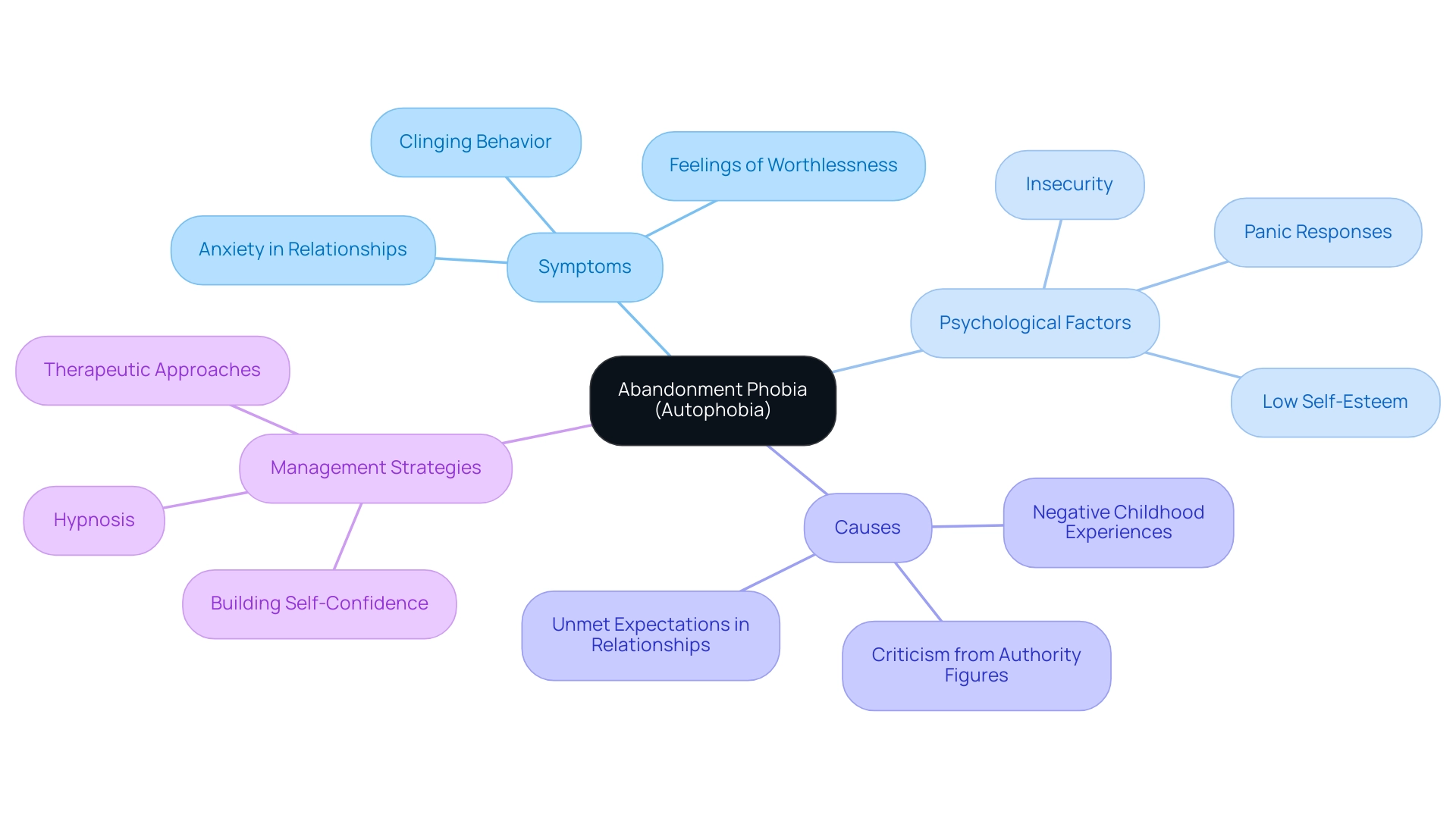
Recognizing the Signs: Symptoms of Abandonment Phobia
Frequent signs of separation phobia include:
- Intense anxiety at the thought of being left alone
- Avoidance of relationships due to fear of rejection
- Distress when confronted with separation
Individuals may exhibit:
- Clingy behavior
- Experience panic attacks
- Feel overwhelming sadness when anticipating potential abandonment
Physical symptoms can also manifest, such as:
- Increased heart rate
- Sweating
- Difficulty breathing
Recognizing these signs is essential for addressing the issue effectively and seeking appropriate support. Anxiety is a common issue, often arising from psychological trauma, and understanding its causes can lead to more effective solutions.
Traditional treatments, while beneficial for some, may fall short in addressing the underlying psychological triggers, often focusing solely on managing symptoms rather than resolving the root causes. This is where the transformative effects of hypnosis at Goodwin Hypnosis can play a pivotal role.
Client testimonials show how hypnosis has enabled people to conquer their anxieties and regain their lives, offering a compassionate route to healing. By acknowledging these symptoms and their roots, people can embark on a journey of recovery and resilience, recognizing that hypnotherapy offers a viable alternative to conventional methods that may not fully address their needs.
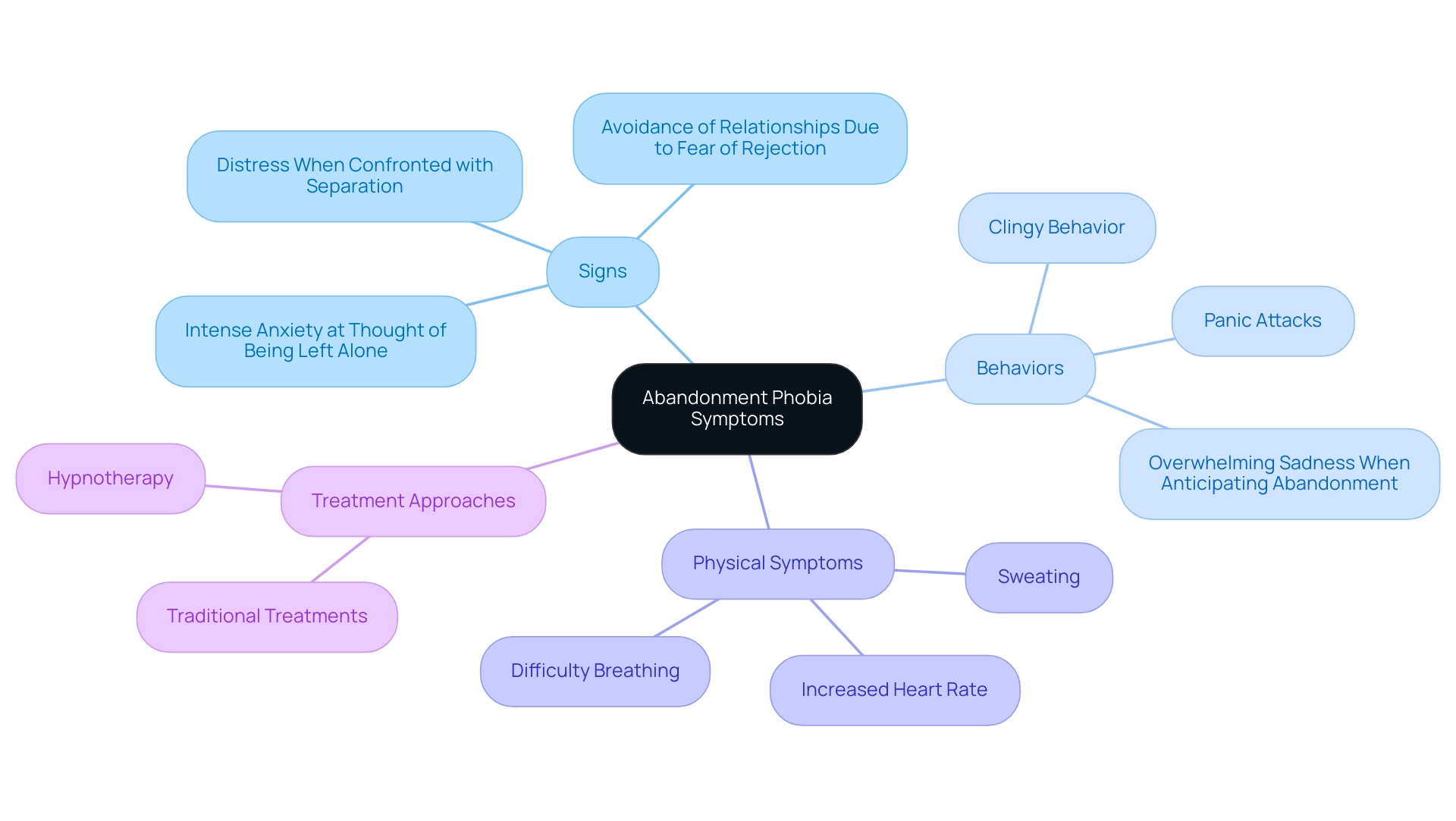
Exploring the Causes: What Triggers Abandonment Phobia?
Abandonment phobia often stems from early life experiences, such as neglect or loss of a parent or caregiver. Childhood trauma, such as psychological mistreatment or inconsistent caregiving, can result in insecure attachment styles, causing people to be more likely to develop abandonment anxieties. Significant life changes, such as divorce or the death of a loved one, can also act as triggers. Understanding these causes is crucial in recognizing patterns and beginning the healing journey.
At Goodwin Hypnosis, personalized one-on-one sessions provide a compassionate and effective approach to healing. Through hypnosis, individuals can transform limiting beliefs and tackle psychological and behavioral issues, fostering self-awareness and personal growth.
For example, Dr. Waldo's experience demonstrates how hypnosis assisted him in managing grief and surpassing his anxiety about death, allowing him to honor his loved one's life instead of focusing on loss. The testimonials from clients such as Amanda Taylor and Loni Paige further illustrate the positive effect of hypnosis, assisting them in overcoming deep-seated anxieties and grief, ultimately attaining a more balanced emotional state.
If you're ready to take the first step towards recovery, consider scheduling a consultation with us at Goodwin Hypnosis.
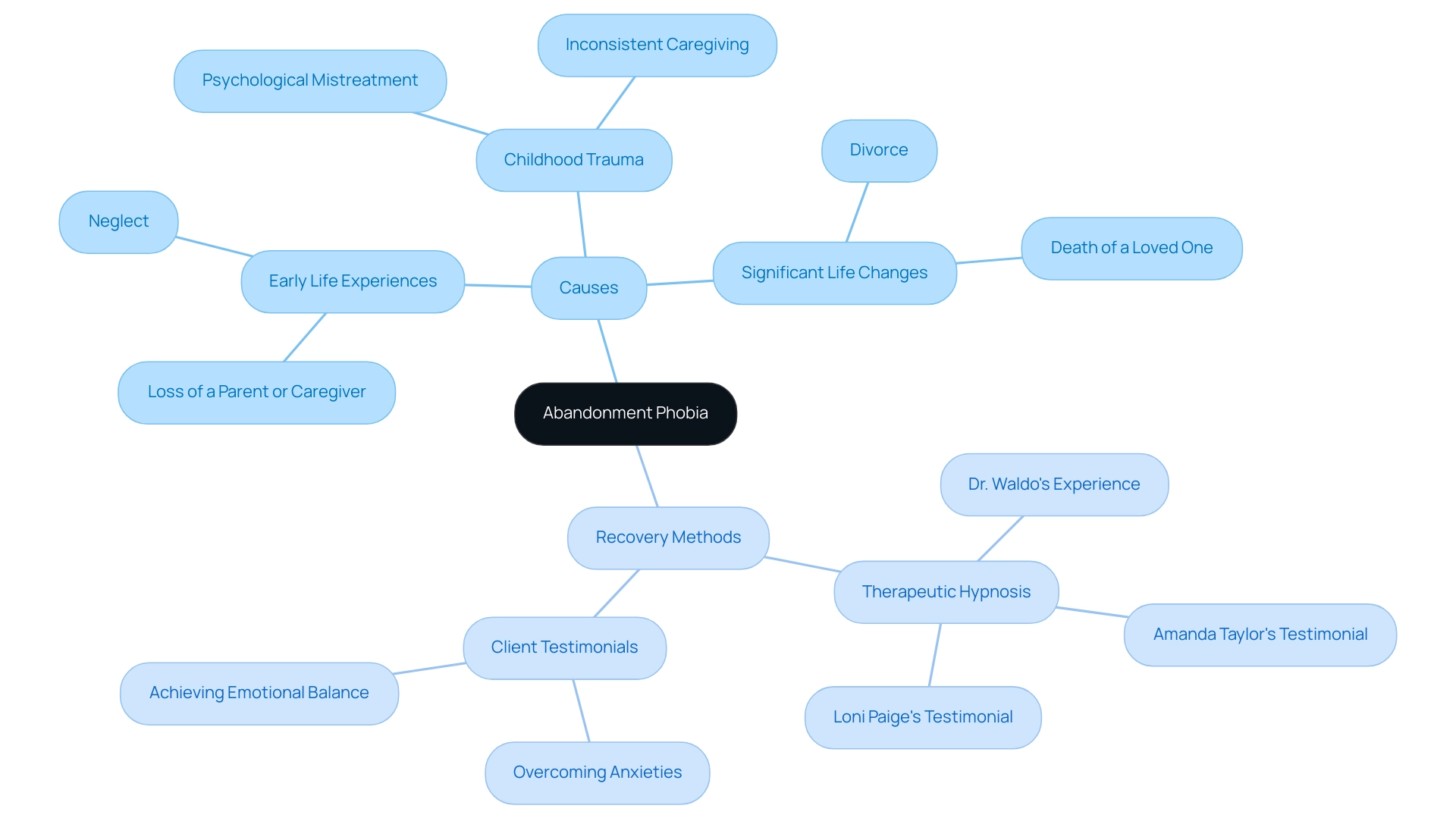
Overcoming Abandonment Phobia: Strategies and Treatments
Effective methods for overcoming separation phobia include:
- Cognitive-behavioral therapy (CBT):
-
Assists people in challenging negative thought patterns and cultivating healthier reactions to feelings of anxiety.
-
Mindfulness techniques:
-
Encourage individuals to stay present and reduce anxiety related to potential abandonment.
-
Practicing self-compassion:
-
Building a strong support system of friends and family can aid in recovery.
-
Hypnosis and NLP methods:
- Provided by Goodwin Hypnosis, may be especially beneficial in tackling deeply ingrained anxieties and promoting psychological healing.
By targeting the root causes of psychological challenges such as anxiety, addictions, and relationship problems, our compassionate hypnotists can enhance the healing process, empowering you to break free from internal obstacles and reclaim control over your life.
Taking the first step towards personal recovery and transformation is possible with the right support. Contact us today to take the first step towards recovery.
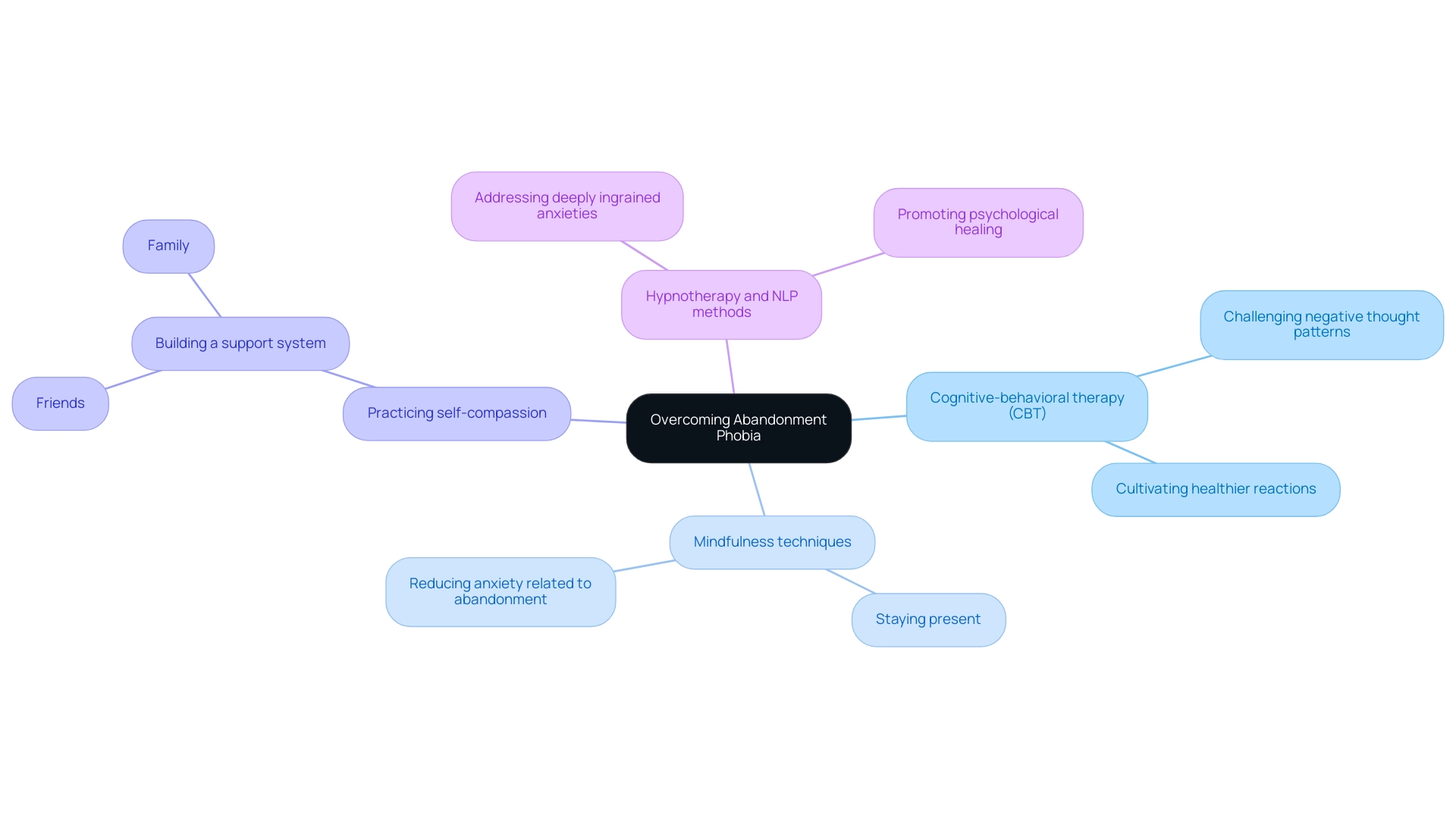
The Role of Therapy and Support in Healing from Abandonment Phobia
Therapy plays a vital role in healing from abandonment phobia, providing a safe space for individuals to examine their anxieties and develop coping strategies. At Goodwin Hypnosis, we emphasize understanding the root causes of anxiety rather than simply labeling it, which can often lead to more effective treatment outcomes.
Numerous clients have shared transformative experiences where hypnotherapy helped them overcome deep-seated anxieties and emotional trauma, allowing them to reclaim their confidence and self-worth. For instance, one client expressed that after just a few sessions, they felt like the fear that once chased them had vanished, highlighting the effectiveness of our approach.
Practitioners can offer guidance, support, and tools tailored to the individual's needs, including techniques such as NLP and memory reconsolidation, which have proven effective in addressing underlying issues. Engaging with support groups can foster a sense of community and connection, as mentioned by clients who found shared experiences invaluable in their healing journey.
Encouraging open conversations with trusted friends and family members can also create a supportive environment that nurtures healing. Remember, seeking help is a courageous step toward reclaiming emotional balance and well-being, and with the right support, you can experience profound changes in your life.
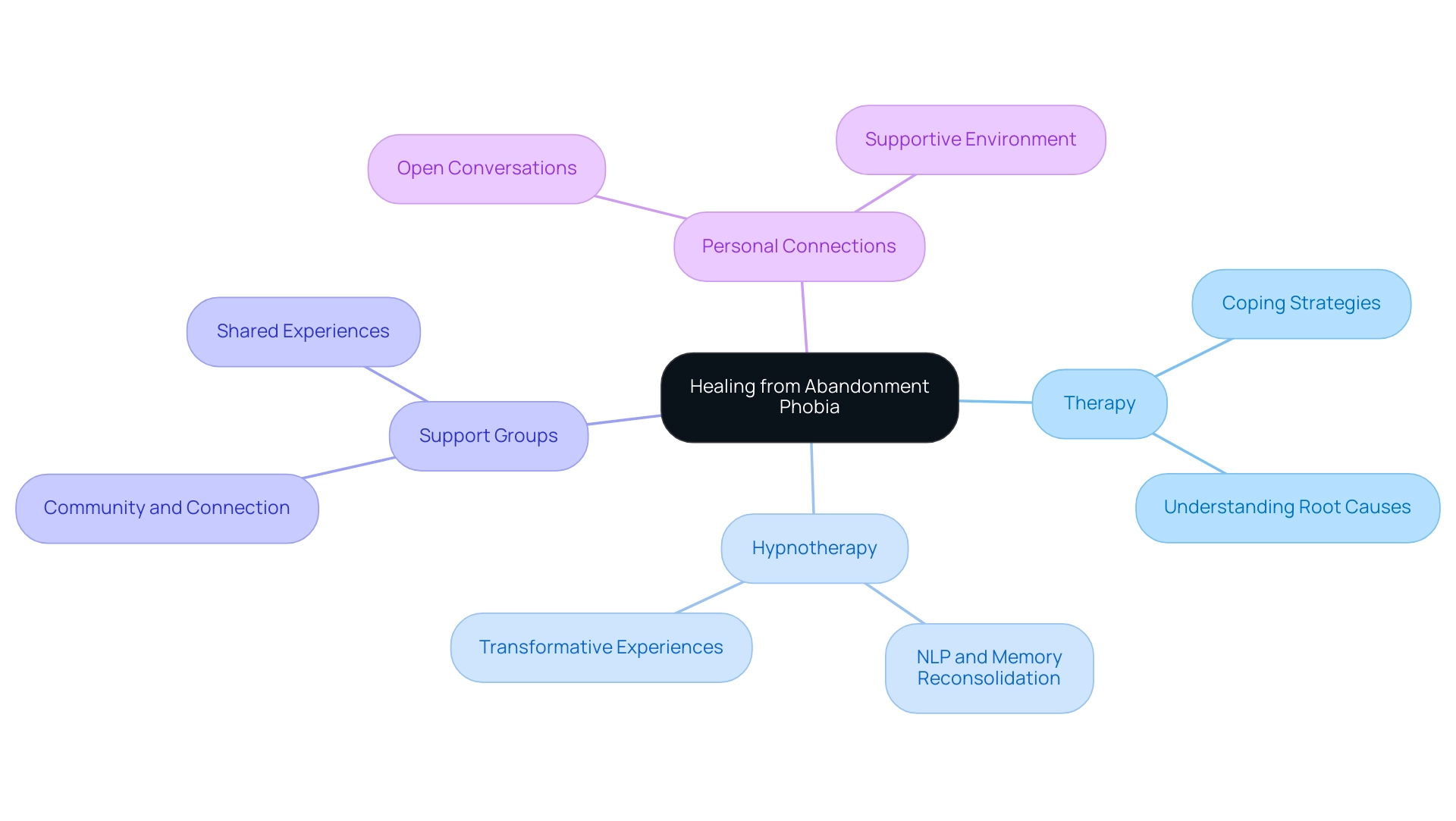
Conclusion
Abandonment phobia, or autophobia, is a complex emotional struggle that affects many individuals, intertwining deep-seated fears with past experiences. By recognizing the signs and symptoms, such as intense anxiety and clingy behavior, individuals can begin to understand the profound impact this fear has on their relationships and self-worth. The journey towards healing involves not only acknowledging these feelings but also addressing their roots through compassionate and effective therapies, including hypnotherapy and cognitive-behavioral strategies.
The exploration of the causes behind abandonment phobia reveals how early life experiences can shape one's emotional landscape. Understanding these triggers is crucial for personal growth and recovery. The testimonials from those who have experienced transformative sessions at Goodwin Hypnosis highlight the potential for profound change when individuals engage in therapeutic practices that foster self-awareness and resilience.
Ultimately, overcoming abandonment phobia is not just about managing symptoms; it’s about reclaiming one’s confidence and building healthier relationships. With the right support and strategies, individuals can embark on a transformative journey, finding peace within themselves and fostering connections that are free from the shadows of fear. This path toward healing is not only possible but a courageous step towards a more fulfilling and emotionally balanced life.




